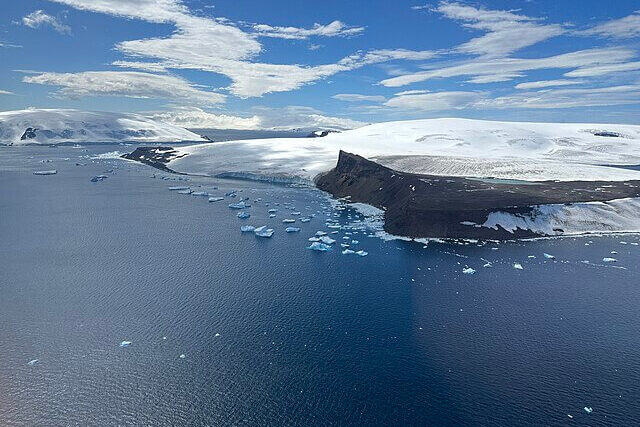
In the frigid depths of the Earth’s oceans, a critical component of the planet’s circulatory system is facing a dramatic slowdown, with potentially severe consequences for climate stability.
This oceanic conveyor belt, responsible for regulating the planet’s energy balance, is now at risk of slowing by approximately 40% before 2050, as revealed by the most detailed global model of Antarctic water masses and deep-sea currents published in the journal Nature.
“Earth’s climate is fundamentally controlled by our ocean and by the ocean’s overturning circulation,” says Matthew England, an oceanographer at Australia’s University of New South Wales.
The intricate process begins in the southern Antarctic seas, where freezing seawater sheds its salt, making the surrounding water denser. This super-salty Antarctic Bottom Water (AABW) descends over 13,000 feet and starts its journey northward into the submerged ocean basins. Over time, AABW moves toward subtropical regions, where surface currents bring it upward, displacing warmer water to higher latitudes. This displaced water, in turn, freezes, descends, and re-enters the cycle.
This mechanism transports some of the coldest water on Earth, redistributing heat, carbon, oxygen, and nutrients globally. It sustains phytoplankton, fuels ecosystems, and plays a crucial role in regulating climate. However, this system is under threat due to the impact of human activities on the environment.
Greenhouse gas emissions have led to polar warming, causing the Antarctic ice shelf to melt and release significant amounts of freshwater into the sea. This influx reduces the salinity and density of polar water, making it less prone to sinking, thus disrupting the circulation process.
“It’s alarming in the sense that the feedback from this collapse of the overturning is more warming, and that means more ice melt,” England says. “There’s a chance that we’ve locked in a collapse of this overturning.”
This breakdown, not witnessed for over 100,000 years, would have catastrophic consequences, exacerbating existing challenges like collapsing marine ecosystems, more powerful cyclones, heatwaves, coral reef bleaching, and rising sea levels.
Research led by scientists like England has utilised direct observations of temperature, along with measurements from the broader oceanographic community, including oxygen levels across ocean strata and data collected from transducers attached to elephant seals.
“They made a model that created Antarctic Bottom Water in a realistic way, and nobody else had understood that,” says Spencer Jones, a physical oceanographer at Texas A&M University who was not involved in the study.
These finely detailed observations align with projections in recent Intergovernmental Panel on Climate Change reports, underscoring the pivotal role of melting ice shelves in driving circulation changes.
England emphasises that the success of their experiment involved an element of luck, but avoiding the predicted outcomes will require deliberate and immediate action.
“We’re probably halfway into the slowdown we projected,” he says. “It’s a tough ship to turn around, but with dramatic emissions reductions, we can save it from a full collapse.”
As humanity continues to grapple with the consequences of climate change, understanding and mitigating the impact on deep-sea circulation systems becomes increasingly urgent.
——————————————————————————
At Natural World Fund, we are passionate about stopping the decline in our wildlife.
The decline in our wildlife is shocking and frightening. Without much more support, many of the animals we know and love will continue in their decline towards extinction.
When you help to restore a patch of degraded land through rewilding to forests, meadows, or wetlands, you have a massive impact on the biodiversity at a local level. You give animals a home and food that they otherwise would not have had, and it has a positive snowball effect on the food chain.
We are convinced that this is much better for the UK than growing lots of fast-growing coniferous trees, solely to remove carbon, that don’t actually help our animals to thrive.
This is why we stand for restoring nature in the UK through responsible rewilding. For us, it is the right thing to do. Let’s do what’s right for nature!
Donate today at https://naturalworldfund.com/ and join in the solution!

